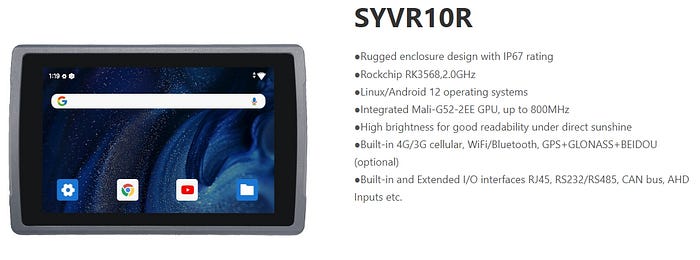Linux tablets have gained significant traction among developers, tech enthusiasts, and professionals who require an open-source, flexible, and secure computing environment. Whether you’re looking for a high-performance business device, a privacy-focused tablet, or a rugged industrial machine, 2025 has some of the best Linux tablets to offer. Here’s our expertly curated list of the 8 best Linux tablets that excel in performance, durability, and user experience.

1. PineTab2
The PineTab2 is an upgraded version of the original PineTab, designed for Linux enthusiasts who require an open-source and customizable experience.
- Display: 10.1-inch IPS touchscreen
- Processor: RK3566 Quad-Core ARM Cortex-A55
- RAM & Storage: 4GB/8GB RAM, 64GB/128GB eMMC storage
- Battery Life: 6–8 hours
- Connectivity: USB-C, microSD, HDMI-out
- OS Support: Various Linux distributions (Manjaro, Debian, Ubuntu)
Why Choose PineTab2?
It offers an exceptional balance between performance, price, and customizability, making it a perfect choice for Linux purists.
2. JingPad A1
The JingPad A1 is a premium Linux tablet that provides an impressive 2K display and high-end specs suitable for professionals.
- Display: 11-inch 2K AMOLED
- Processor: Unisoc Tiger T7510 Octa-Core
- RAM & Storage: 8GB RAM, 256GB SSD
- Battery Life: 10–12 hours
- Connectivity: USB-C, 3.5mm headphone jack, SD slot
- OS Support: JingOS (Linux-based), Ubuntu, Arch Linux
Why Choose JingPad A1?
It is one of the few premium Linux tablets that comes with a high-quality screen and robust performance.
3. Lenovo ThinkPad X12 Detachable (Linux Edition)
A powerhouse 2-in-1 Linux tablet for professionals, Lenovo’s ThinkPad X12 is designed for business users who need flexibility and performance.
- Display: 12.3-inch FHD touchscreen
- Processor: Intel Core i5/i7 (11th Gen)
- RAM & Storage: 8GB/16GB RAM, 256GB/512GB NVMe SSD
- Battery Life: Up to 10 hours
- Connectivity: Thunderbolt 4, USB-C, Wi-Fi 6
- OS Support: Ubuntu, Fedora, Debian
Why Choose Lenovo ThinkPad X12?
A high-performance, durable, and secure Linux tablet with enterprise-grade reliability.
4. StarLite Mk IV
The StarLite Mk IV is an ultra-portable, energy-efficient Linux tablet, perfect for on-the-go users.
- Display: 11.6-inch IPS Full HD
- Processor: Intel Pentium Silver N6000
- RAM & Storage: 8GB RAM, 240GB NVMe SSD
- Battery Life: 8–10 hours
- Connectivity: USB-C, micro HDMI, SD Card Slot
- OS Support: Ubuntu, Debian, Arch Linux
Why Choose StarLite Mk IV?
It offers a compact form factor with high efficiency, making it ideal for travelers and students.
5. Purism Librem 11
A privacy-focused Linux tablet with top-tier security, the Purism Librem 11 ensures full control over your data.
- Display: 11.6-inch Full HD IPS
- Processor: Intel N5100 Quad-Core
- RAM & Storage: 8GB RAM, 256GB SSD
- Battery Life: 9–12 hours
- Connectivity: USB-C, microSD, 3.5mm audio
- OS Support: PureOS, Ubuntu, Fedora
Why Choose Purism Librem 11?
It’s a privacy-centric device with hardware kill switches, perfect for security-conscious users.
6. Dell Latitude 7320 Detachable
Dell’s Latitude 7320 Detachable is a Linux-ready business-grade tablet designed for professionals who require high performance.
- Display: 13-inch FHD touchscreen
- Processor: Intel Core i5/i7 (11th Gen)
- RAM & Storage: 8GB/16GB RAM, 256GB/512GB NVMe SSD
- Battery Life: 10–12 hours
- Connectivity: Thunderbolt 4, USB-C, Wi-Fi 6
- OS Support: Ubuntu, Red Hat Enterprise Linux
Why Choose Dell Latitude 7320?
A robust and reliable tablet suitable for enterprise environments.
7. Waysion SYVR10R
The Waysion SYVR10R is a rugged 10-inch Linux tablet designed for industrial and field applications.
- Display: 10-inch daylight-viewable touchscreen
- Processor: ARM Cortex-based processor
- RAM & Storage: 4GB/8GB RAM, 64GB/128GB eMMC
- Battery Life: 10+ hours
- Connectivity: USB-C, Wi-Fi, GPS, 4G LTE
- OS Support: Linux, Android
Why Choose Waysion SYVR10R?
A durable, high-performance tablet built for harsh environments, making it perfect for industrial use.

8. Microsoft Surface Pro 9 (Linux Edition)
- Display: 13-inch PixelSense Flow display
- Processor: Intel Core i5/i7 (12th Gen)
- RAM & Storage: 8GB/16GB RAM, 256GB/512GB SSD
- Battery Life: 10+ hours
- Connectivity: USB-C, Thunderbolt 4, Wi-Fi 6
- OS Support: Ubuntu, Debian, Fedora
Why Choose Microsoft Surface Pro 9?
A powerful and stylish Linux-compatible tablet with excellent build quality.
Final Thoughts: Which Linux Tablet is Right for You?
Choosing the right Linux tablet in 2025 depends on your specific needs and budget. If you’re looking for an affordable and customizable option, the PineTab2 is an excellent choice. For business professionals, the Dell Latitude 7320 and Lenovo ThinkPad X12 provide top-tier performance. If rugged durability is a priority, the Waysion SYVR10R is built for the toughest conditions.
No matter which tablet you choose, a Linux-powered device ensures you get an open-source, secure, and flexible computing experience.
评论
发表评论